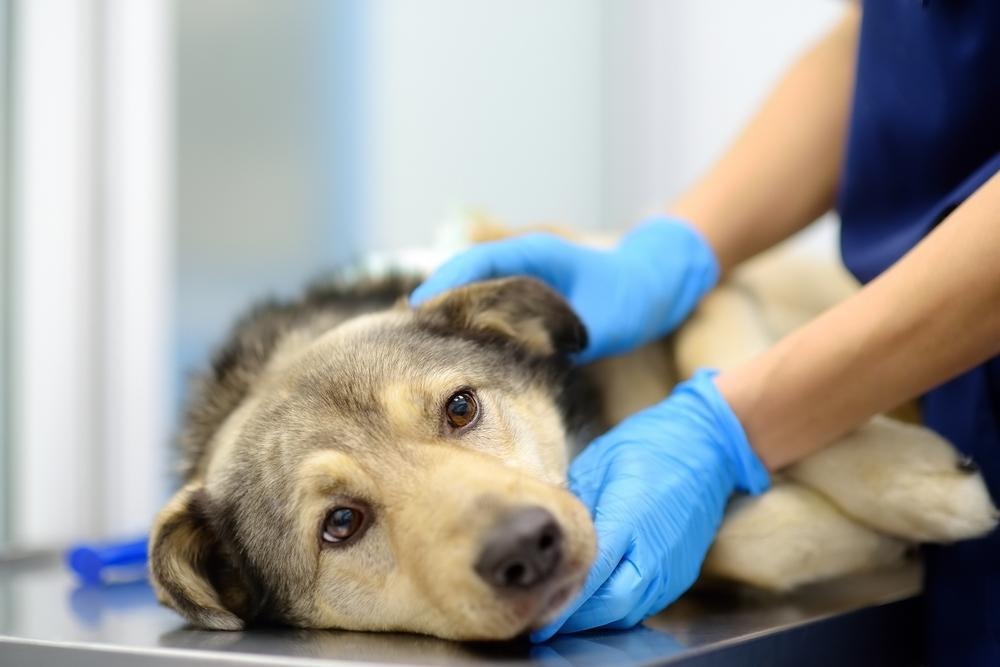

Seeing blood in your dog's poop can be alarming, but although it's never considered normal, it doesn't always mean your dog is seriously ill. Blood in dog feces can be the result of several medical conditions, ranging from mild to serious. While it's always best to consult your veterinarian, having some understanding of what to look for and what the potential causes could be can help ease your worries as you await your pup's appointment.
How To Identify Blood in Dog Stool
It may not seem like the most appealing idea, but you can learn a lot about the health of your dog by monitoring their poop. But knowing what you're looking for starts with understanding the different types. There are a few different ways blood can appear in dog stool:
Bright, Red Blood
This is referred to as "hematochezia", and means that there is bleeding in the lower digestive system or anal glands.
Raspberry Jam Appearance
If a dog has severe inflammation of their digestive tract, it can cause diarrhea with mucus and blood, giving the stool a raspberry jam appearance.
Black, Tarry or Coffee Grounds
Referred to as "melena", this is the result of digested blood. Melena originates from the upper intestines, stomach, or esophagus, so it has traveled through the digestive system.

What Blood in Dog Stool Might Mean
While it can be helpful to identify the type of blood to determine the cause, it's not the sole factor when it comes to whether it's dangerous or not. The exception to this is raspberry-jam-like poop, which is often accompanied by vomiting, fever, and loss of appetite and can cause severe dehydration, making it a medical emergency.
In other cases, it largely depends on other signs that your dog is showing. If you notice one or two bloody streaks in your dog's stool and they are acting completely normal otherwise, then there is likely no cause for concern. However, it's always best to consult with your vet. If you notice blood in your dog's stool and they are vomiting, not eating, have a fever, are acting uncomfortable or sick in any way, or if you are worried, call your veterinarian. Other issues to keep an eye out for include blood in several bowel movements, a lot of blood in the stool or diarrhea for more than one day.
In any case, contacting your vet is the best way to get an accurate diagnosis and evaluate your pup's health.
Potential Dog Blood in Stool Causes
Anything that irritates or inflames the digestive tract or anal glands can cause bloody, loose stool in dogs. This includes:
- Dietary indiscretion (ate something they shouldn't), resulting in enteritis or gastritis
- Bacterial or parasitic infections in the gut
- Intestinal blockage
- Inflammatory bowel disease (IBD)
- Cancer
- Certain medications, including NSAIDS and corticosteroids
- Kidney disease
- Liver disease
- Pancreatitis
- Addison's disease
- Esophagitis
- Clotting abnormalities or rat poisoning
- Anal sac disease
On occasion, dogs may also develop melena due to swallowing blood that can come from the respiratory tract or the mouth.
As you can see, there is a range of things that can cause bloody stool, ranging from mild to serious, and sometimes the bleeding may not even be in the digestive tract. This is why contacting your vet is essential to getting an accurate diagnosis.
When you take your dog to the vet to treat their condition, expect the veterinarian to ask you questions and conduct a full physical examination. They may also want to run some tests depending on what they suspect the issue is. These tests vary but may include blood, urine, stool sample, and imaging tests.
Treatment and Prevention
Treatment of bloody loose stool in dogs varies depending on the underlying cause and severity of the dog's condition. Dogs that are otherwise healthy but have mild bloody stool due to intestinal parasites, for example, may only require outpatient deworming. In contrast, a dog with severe hemorrhagic enteritis is a true medical emergency, and will require hospitalization, fluid therapy, monitoring and medication.
Treatment may also include gastric protectants, antacids, anti-nausea medication, a food change or antibiotics. Some dogs may require surgery to remove a foreign body, cancer, severe ulcers or to take biopsies. Dogs that have lost a lot of blood may require a blood transfusion. Dogs that have bloody stool due to respiratory disease, dental disease, or liver or kidney disease will require treatment for those conditions. The important things to remember are that there is a wide range of potential causes of bloody stool and it's essential to contact a vet to get to the root of the problem.
Although you may not be able to completely prevent your dog from having a bout of bloody stool, there are several things you can do to minimize risk, including:
- Have your dog examined by a veterinarian at least once a year to catch problems early.
- Feed your dog a high-quality, complete and balanced dog food.
- Avoid feeding your dog rich or fatty people food, as these foods can cause stomach upset, inflammation of the digestive tract or pancreatitis.
- Brush your dog's teeth regularly and have their teeth cleaned as your veterinarian recommends to prevent dental disease.
- Keep your dog on year-round parasite prevention to control intestinal parasites.
- Administer medications as prescribed to minimize negative side effects.

Your Dog's Health is Worth the Call
While it can be scary to see that your dog has bloody stool, remember that treatment is often possible. There are several causes, and not all of them are major health problems. Focusing on early identification and partnering with your vet can help you get the care your furry friend needs to maintain a healthy life.






















